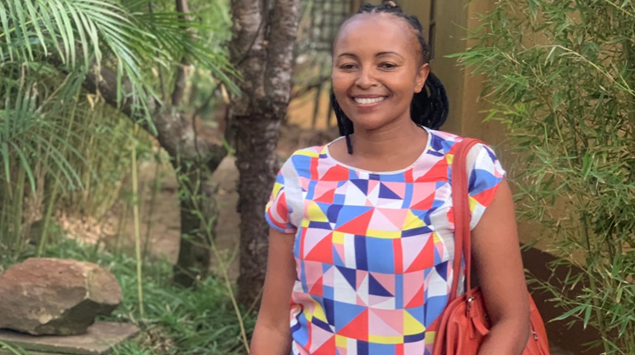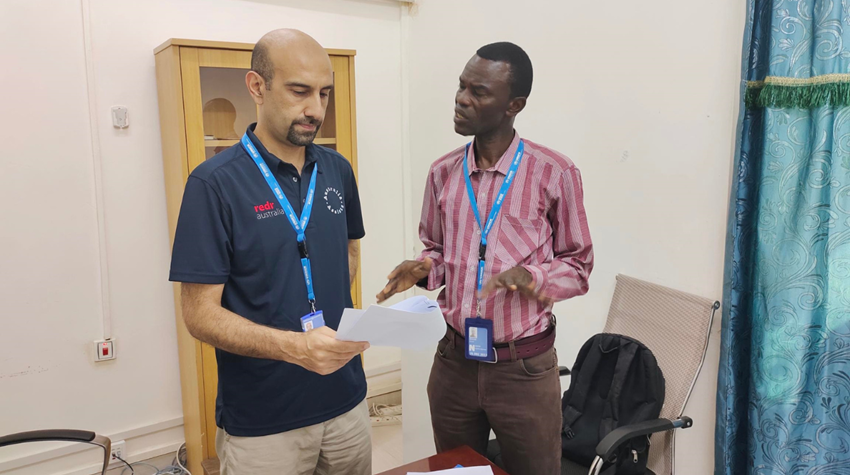This day serves as a reminder of the growth in disability inclusion practice as well as the continuing work to protect the rights and dignity of people with disabilities around the world.
Spreading disability inclusion
Australia Assists is the Australian Government’s humanitarian deployment capability. In the context of this global awareness day, it is timely to recognise the work of Australia Assists and the deployees in the field mainstreaming disability inclusion in their varied humanitarian projects. Deployees drive positive change by acknowledging and addressing the unique challenges faced by people with disabilities in humanitarian crisis. Deployee achievements include better collection and use of disability data, more accessible infrastructure and improved consultations with organisations of persons with disabilities (OPD’s) to ensure disaster preparedness and response better reflects the needs of people with disabilities.
Inclusion in the Pacific
When tropical cyclones Judy and Kevin hit Vanuatu in March, Australia Assists deployee Annie was already on the ground supporting the Department of Strategic Policy, Planning and Aid Coordination (DSPPAC) and the Department of Women’s Affairs (DWA) to ensure gender, disability and social inclusion were integrated into disaster recovery plans. Following these cyclones, Annie analysed how the event impacted people with disability and included disability recovery needs in the Vanuatu Government Post Disaster Needs Assessment.
And in Northeast Africa
In Sudan, Australia Assists Program deployee Muhammad supported UNHCR as a shelter and non-food items (NFI) coordination expert ensuring that people impacted by the conflict and flood crises received targeted assistance. This included strengthening the UNCHR-led Shelter and NFI cluster, which plays a vital role in supporting thousands of internally displaced persons (IDP). As part of this role, Muhammad ensured that disability inclusion was integrated into cluster operations at both strategic and operational level. For instance, ensuring that messaging around disability inclusion in shelter and NFI assistance were disseminated, and tools were developed to prioritise the needs of people with disabilities. Muhammed also reviewed IDP shelter design to ensure sites are accessible and the needs of people with disabilities were prioritised.
It’s all part of the global plan
Disability inclusion is not a ‘nice to have’ but a ‘must have’ for both humanitarian and sustainable development goals.
The Sustainable Development Goals (SDGs) are a framework designed to tackle global issues from environmental sustainability to economic growth and disability is recognised and referenced in several parts of the SDGs.
For example, Goal 4 aims to provide inclusive and equitable quality education, with a focus on eliminating gender disparities and ensuring equal access for all, including persons with disabilities. Goal 8 focuses on promoting economic growth, employment, and decent work for all, explicitly mentioning persons with disabilities.
Goal 10 is dedicated to reducing inequalities and promoting social, economic, and political inclusion, which includes individuals with disabilities. Goal 11 seeks to create inclusive, safe, and sustainable cities and human settlements, with specific provisions for accessibility.
Lastly, Goal 17 underscores the importance of data collection and monitoring of the SDGs, including disability-disaggregated data, as an essential tool for achieving sustainable development.
Breaking down barriers to Inclusion
The path to full inclusion is not without its challenges. One major hurdle has been the awareness and training of humanitarian workers, including at leadership levels. Disability inclusion is becoming a mainstay for crisis response and Australia Assists Program deployees have benefitted from one-on-one mentoring around core practices and considerations in disability inclusion through partners like CBM Australia.
Australia Assists Program deployee Maria supports UN Women to mainstream gender and protection in humanitarian action. A major part of her role is developing and delivering training for frontliners from local organisations, international organisations and other UN agencies from across the humanitarian sector. After undertaking CBM Australia’s disability inclusion mentoring, Maria was able to strengthen her trainings.
“After the support from CBM, disability inclusion was made easier. I make sure all the training material I develop addresses the intersectionality between disability and gender,” said Maria.
The Overlooked Resource: Persons with Disabilities
International Day of Persons with Disabilities serves as a powerful reminder of the work needed to create inclusive societies. It is imperative to recognise the untapped potential of individuals with disabilities as contributors with valuable lived experience.
Australia Assists Program deployee Jane, is currently on deployment as a Disability Inclusion Advisor with UNFPA, working remotely supporting people in need in Myanmar. Jane is proud to be a humanitarian and supporting disability inclusion as a technical expert and someone with lived experience.
Jane says “Working in disability inclusion is not just a job but a calling for me. My lived experience with disability enables me to relate to the needs of people with disabilities and fuels my passion for identifying relevant and lasting solutions. I have also noticed that people with disabilities and their representative organisations easily reach out to me as they know I am one of them.” Efforts form UN Agencies and programs like Australia Assists are helping change the pathways for real and meaningful inclusion for people living with disability which is a mark of real progress.
 Jane is a Disability Inclusion Advisor with UNFPA.
Jane is a Disability Inclusion Advisor with UNFPA.
In line with it’s Disability Action Plan, the Australia Assists Program is committed to the inclusion of people with disabilities in humanitarian action, focusing on removing the physical, environmental, and social barriers that prevent full participation. This can be achieved through the strengthening of training, staffing and deployment processes to become more accessible and inclusive for people with disabilities. Led by Australia Assists Program Inclusion Advisor Paul Deany, the Disability Inclusion Support Scheme has been realised this year and aims to address barriers to participation by supporting persons with disabilities needs with reasonable accommodation, to participate in training and on deployments.
Inclusive humanitarian action requires placing persons with disabilities at the centre of any response. The road to true inclusion is ongoing, but with commitment and collaborative efforts, it is possible to build a world where no one is left behind.
To find out more about Australia Assists’ commitment to disability inclusion, read the Disability Action Plan.


